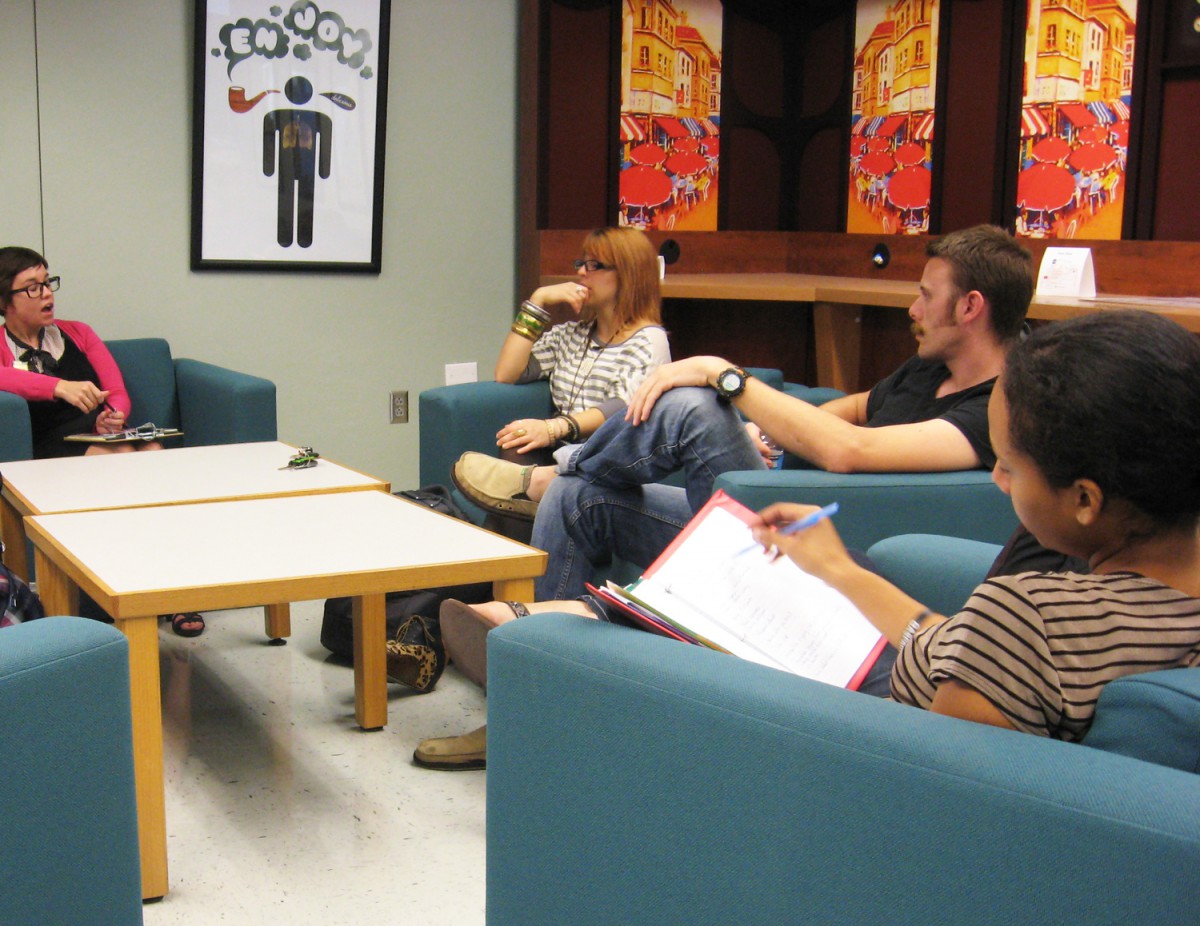Students interested in the Peace Corps got a chance to talk to volunteer and recruiter Katie Roders, who addressed the basics of the organization and shared her experience working abroad.
The Peace Corps is a federally funded volunteer organization that works with community development, health, education and other programs in developing countries.
Rather than posting behind a table set with pamphlets, chairs were pulled into a circle for casual conversation led by Roders.
Roders, 27, got her degree in women’s studies at USF, but knew only “hello” in Russian before setting out for a 27-month stint in Kazakhstan, a country formerly under Soviet rule.
She discussed the fundamentals of the Peace Corps: the long application process of nine months to a year, the federally-funded living stipend, adjusting to food (Roders broke an eight-year vegetarian diet while abroad) and living with a host family for nearly a year.
The Peace Corps requires a minimum of two years of volunteer work overseas. That doesn’t include a three-month training process covering language, technical training and cultural integration classes. After that, volunteers begin their work and assimilate themselves into the community.
“They want people willing to go anywhere,” Roders said, advising hopefuls to be flexible and focused on volunteer work rather than the whereabouts.
The Peace Corps currently works in 77 countries, with over 40 percent serving in Africa.
Students’ degrees often qualify them into a specific program, Roders said, who was assigned at a Community Development Center in Karaganda with a focus on HIV/AIDS because of her employment and volunteer background in public health.
USFSP assistant professor Joseph Dorsey, former Peace Corps volunteer, met with Roders before a formal introduction in Davis Hall.
Dorsey, who teaches environmental policy, served on the Ivory Coast after finishing his undergraduate degree. Like Roders, he was a Peace Corps recruiter during his tenure in graduate school.
He described the Peace Corps as a very transformative for an individual.
“You never come back quite the same person,” Dorsey said.
Dorsey graduated from Howard University in Washington, D.C., a historically black college. The university collectively boasts African-American pride, he said, but when he got to Africa he had a sort of identity crisis. Dorsey, who is black, was received differently than he expected. The Africans viewed him as solely American.
“You become a strange-looking white man,” he said.
Dorsey’s bachelor’s degree was in nutrition, which became his focus while volunteering in Africa.
“I studied nutrition at a college level, but I’d never seen malnutrition,” Dorsey said in Davis Hall to a room of students.
He recalled his first days working in Africa, and the time he mistook a severely malnourished child for a burn victim.
Malnourishment takes different forms, from a swollen belly to lacerated skin caused by severe edema. Edema can occur where there is a protein deficiency in the patient’s blood.
When Dorsey got back to America, infomercials with starving children from African villages were hard for him to stomach.
“They weren’t just pictures on a screen anymore,” he said. He could still remember the smell and feel of it.
Adjusting to life after the Peace Corps is a bit difficult, both Roders and Dorsey said.
“When I got back from Peace Corps I had a plan, like a super plan. And it didn’t work out,” Roders said, who returned to the U.S. with aim to attend an Ivy League school for her master’s degree. She changed plans because of the cost of student loans that would be racked up without benefits for her volunteer work.
As of April 2011, a stipend of $7,425 is given to volunteers who served 27 months when they return to the United States. The allowance is to aid volunteers for readjustment back home.
Dorsey attended graduate school after serving abroad, and worked as a Peace Corps recruiter at the University of Michigan.
UM is regarded as the birthplace of the Peace Corps, after President John F. Kennedy visited in 1960 and famously challenged students to commit time to serve society abroad.
Roders said after the Peace Corps, volunteers want hit the ground running, but they will need time to calm down.
Now Roders is working towards her master’s degree in public health at USF, while putting in 20 hours a week as the university’s Peace Corps ambassador.
She credits her flexibility and openness to “just go with it” to her experience in the Peace Corps, which celebrates its 50th anniversary this year.
Photo by Jane McKinnis



